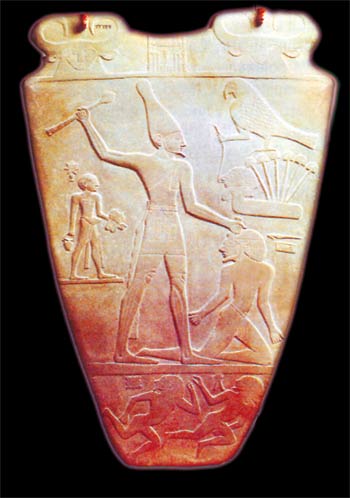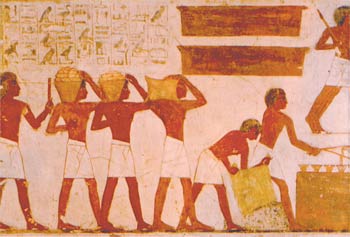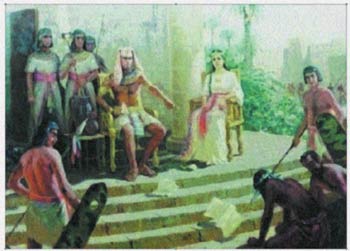On Mount Sinai, together with the revelation, the Prophet Moses (pbuh) was bestowed with great wisdom from our Lord. There, Allah enlightened the Prophet Moses (pbuh) on two subjects especially: destiny and putting one's trust in Allah. Allah inspired the Prophet Moses (pbuh) that his entire life had been within the confines of a certain destiny, and had pursued his journey in line with that destiny. Also, Allah revealed him that he should not fear Pharaoh, but put his trust in our Lord because Allah is with him, sees him, and helps him. As Allah relates in the Qur'an, with this awareness, the Prophet Moses (pbuh) and the Prophet Aaron (pbuh) had gone to Pharaoh and his inner circle, referred to in the Qur'an as "a people of evildoers":
 |
| Pharaoh's rule was based on oppression and cruelty, for which he was proud. The relief above depicts Pharaoh crushing his opponents' skulls. |
Then after them We sent Moses and Aaron with Our Signs to Pharaoh and his ruling circle, but they were arrogant and were a people of evildoers. (Surah Yunus: 75)
The dialogue between the Prophet Moses (pbuh) and Pharaoh is related in the Qur'an. A close examination of the answers Pharaoh gave to the Prophet Moses (pbuh) discloses his highly unreasonable and irrational way of thinking. From what he said, we understand that, rather than considering the words of the Prophet Moses (pbuh), he witlessly sought to defeat him and denounce him. Surely this was an end he could never attain. To this purpose, Pharaoh tried to win over the people around him or impose his crooked rationale on others. The dialogue between the Prophet Moses (pbuh) and Pharaoh was as follows:
Pharaoh said, "Who then is your Lord, Moses?"
He said, "Our Lord is He Who gives each thing its created form and then guides it."
He (Pharaoh) said, "What about the previous generations?"
He said, "Knowledge of them is with my Lord in a Book. My Lord does not misplace nor does He forget."
It is He Who made the earth a cradle for you and threaded pathways for you through it and sent down water from the sky by which We have brought forth various different types of plants. Eat and pasture your cattle. Certainly there are Signs in that for men of understanding. From it We created you, to it We will return you, and from it We will bring you forth a second time. (Surah Ta-Ha: 49-55)
Rather than evaluating this message with a sound mind and clear conscience, Pharaoh and his inner circle assessed it based on their accustomed way of thinking, founded on the deviant religion of their ancestors. According to their superstitious beliefs, Pharaoh was a deity (Allah is beyond that), far from admitting the idea of the existence of Allah:
As the above verse makes clear, Pharaoh's people were deluded to think the Prophet Moses' (pbuh) intention in proclaiming the existence and unity of Allah, was to seize power in the land, by abolishing the perverted religion inherited from their ancestors. The perverted religion entitled Pharaoh and his inner circle to obvious advantages, and the change of this perverted religion implied a loss of power for Pharaoh and the shift of authority to the Prophet Moses (pbuh). They considered the Prophet Moses (pbuh) and the religion revealed to him by our Lord with this deviant viewpoint and believed that the Prophet Moses (pbuh) had simply come to oppress the people, just as Pharaoh had. This narrow understanding of theirs is best expressed in the answer of Pharaoh and his inner circle offered to the The Prophet Moses (pbuh) and the Prophet Aaron (pbuh). Allah reveals as follows in the related verse:
However, as Allah relates in the verse, the accusation expressed in the words "Have you come to us to gain greatness in the land" by Pharaoh and his followers was merely an insincerely motivated attempt at slander. The Prophet Moses' (pbuh) intention was far from desiring to rule Egypt; he had only asked Pharaoh to send the tribe of Israel away with him. The Prophet Moses' (pbuh) request was the release of the Children of Israel, an enslaved nation who had been living under grief-ridden conditions:
Nonetheless, Pharaoh, denying his request, tried various other methods against the Prophet Moses (pbuh). By reminding the Prophet Moses (pbuh) of how he had been brought up in his palace, he was attempting to remind him of the loyalty he owed to him and, with his foolish mind, to allegedly humiliate him in the eyes of his inner circle. Furthermore, with his shallow mentality, he tried to coerce him by mention of the Egyptian man he unintentionally killed. The Prophet Moses' (pbuh) response to all such mistreatment was one particular to a true believer, who unconditionally submits to his destiny, and has a full grasp of its implications. Allah tells in the related verse of the Qur'an as follows:
He (Pharaoh) said, "Did we not bring you up among us as a child and did you not spend many years of your life among us? Yet you committed the deed you did and were ungrateful."
The Prophet Moses (pbuh) explained to Pharaoh that his growing up in the palace was not a favor but a result of his cruel oppression. Allah relates in the Qur'an thus:
 |
| An ancient Egyptian figure depicting theIsrael under Pharaoh's rule of the children of Israel under Pharaoh's rule. |
And anyway you can only reproach me with this favour because you made the tribe of Israel into slaves! (Surat ash-Shu'ara: 22)
Despite any hesitation he may have previously felt, the Prophet Moses (pbuh) delivered the message fearlessly and forthrightly to Pharaoh and his circle of rulers, mindful that Allah had reminded him of His companionship. Pharaoh first asked the Prophet Moses (pbuh) about our Lord:
Pharaoh said, "What is the Lord of all the worlds?'
He (Moses) said, 'The Lord of the heavens and the earth and everything between them if you knew for sure."
He (Pharaoh) said to those around him, "Are you listening?"
He (Moses) said, "Your Lord and the Lord of your forefathers, the previous peoples." (Surat ash-Shu'ara: 23-26)
In his response, the Prophet Moses (pbuh) was explaining that the religion of Pharaoh's ancestors was invalid since they were also transgressors. Allah was the Lord of those ancestors as well. Having nothing to say in reply, with his shallow mentality, Pharaoh resorted to slandering and threatening the Prophet Moses (pbuh) in order to intimidate him:
He (Pharaoh) said, "This Messenger, who has been sent to you, is mad."
He (Moses) said, "The Lord of the East and the West and everything between them if you used your intellect."
He (Pharaoh) said, "If you take any god other than me, I will certainly throw you into prison." (Surat ash-Shu'ara: 27-29)
As is evident, the Prophet Moses' (pbuh) concise explanations and clear evidence clearly defeated Pharaoh. This led him to accuse the Prophet Moses (pbuh) with the slander of being allegedly insane. Here, Pharaoh's primary concern was to try to counteract the powerful influence the Prophet Moses (pbuh) was having on the people. The forthright and convincing manner of the Prophet Moses' (pbuh) speech infuriated Pharaoh. Ultimately, he threatened the Prophet Moses (pbuh) with imprisonment if he continued denying his divinity (Allah is beyond that). This action was merely another manifestation of Pharaoh's cruel character.
At this point, the Prophet Moses (pbuh) declared that he had come with signs proving his prophecy, and performed the two miracles granted to him by Allah:
He (Moses) said, "Even if I were to bring you something undeniable?"
He (Pharaoh) said, "Produce it then if you are someone telling the truth."
So he threw down his staff and there it was, unmistakably a serpent. And he drew out his hand and there it was, pure white to those who looked. (Surat ash-Shu'ara: 30-33)
Pharaoh, and his inner circle, witnessing the two great miracles of Allah performed by the hand of the Prophet Moses (pbuh), thought with a grave foolishness they could have been possible only through sorcery. In order to refuse being impressed by these miracles, they inspired each other to think in the following way:
 |
| A figure illustrating Pharaoh ruling among the slaves brought to him. |
The mentality exemplified here is typical of those who deny the truth. In many stories related in the Qur'an, there are numerous examples of similar people and their responses evidencing a flawed rationale. This condition of mind, blindly committed to following the faith of their ancestors, and rejecting the truth despite clear signs, was not particular only to Pharaoh and his inner circle. Throughout history, deniers similarly always sought a so-called way out. Allah conveys the distorted mindset of the arrogant in the Qur'an as follows:
I will divert from My Signs all those who are arrogant in the earth without any right. If they see every Sign, they will not believe in it. If they see the way of right guidance, they will not take it as a way. But if they see the way of error, they will take that as a way… (Surat al-A'raf: 146)
Pharaoh and his inner circle clearly preferred taking the route of denial and evil rather than choosing to be rightly guided. Despite these miracles, they decided to defy the Prophet Moses (pbuh). Surely for Pharaoh and his inner circle, this was a struggle lost from the very first beginning. To this purpose, they, with their shallow mindset,sought out in their own way so-called opponents to the Prophet Moses (pbuh), who they accused of being a "magician":
Pharaoh claimed the miracles of the Prophet Moses (pbuh) were a magician's tricks, and according to his shallow mindset believed that they could be undone by his own magicians. Therefore, he could allegedly defeat the Prophet Moses (pbuh) to regain his leverage. In reality, however, they were doomed to an all-out defeat by Allah. Moreover, their defeat came from the least expected source.
Their shallow mentality fooled them into being certain of their ultimate victory. Thusthey allowed the Prophet Moses (pbuh) to appoint the time and place for the confrontation:
He said, "Have you come to us to expel us from our land by means of your magic, Moses? We will bring you magic to match it. So fix a time between us and you which neither we nor you will fail to keep at a place where we can meet halfway."
The Prophet Moses (pbuh) chose "the day of the festival" so that all the people could witness the encounter. There was a superior wisdom in this choice. In this way, all the people would hear the message of the Prophet Moses (pbuh) and witness the defeat of Pharaoh and his magicians. Pharaoh accepted the appointed time. The related verses read:
So Pharaoh went away and concocted his scheme and then he arrived.
Moses said to them, "Woe to you! Do not fabricate lies against Allah or He will annihilate you with His punishment. Fabricators of lies are bound to fail."
They argued among themselves about the matter and had a secret conference.
They said, "These two magicians desire by their magic to expel you from your land and abolish your most excellent way of life, so decide on your scheme and then arrive together in force. He who gains the upper hand today will definitely prosper." (Surah Ta-Ha: 60-64)
Call to the way of your Lord with wisdom and fair admonition, and argue with them in the kindest way. Your Lord knows best who is misguided from His way. And He knows best who are guided.
(Surat an-Nahl: 125)